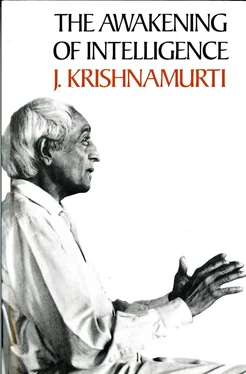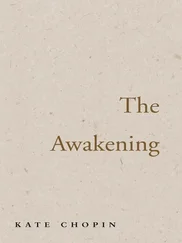If I meditate and continue with what I have already learnt, with what I already know, then I am living in the past, within the field of my conditioning. In that there is no freedom. I may decorate the prison in which I live, I may do all kinds of things in that prison, but there is still a limitation, a barrier. So the mind has to find out whether the brain cells, which have developed through millennia, can be totally quiet, and respond to a dimension they do not know. Which means, can the mind be totally still?
This has been the problem of all religious people throughout the centuries; they realise that you must have a very quiet mind, because then only can you see. If you are chattering, if your mind is constantly in movement, rushing all over the place, obviously it cannot look, it cannot listen totally. So they say, “Control it, hold it, put it in a prison”; they have not found a way of bringing about a mind that is completely and utterly quiet. They say, “Don’t yield to any desire, don’t look at a woman, don’t look at the beautiful hills, the trees and the beauty of the earth, because if you do, it might remind you of a woman, or a man. Therefore control, hold on, and concentrate.” When you do all that, you are in conflict, and therefore there has to be more control, more subjugation. This has been going on for millennia, because they realise they must have a quiet mind. Now, how does the mind become quiet?—without effort, without control, without giving it a frontier? The moment you ask “how” you are introducing a system. Therefore there is no “how”.
Can the mind become quiet? I don’t know what you are going to do about it when you see the problem, when you see the necessity, the truth of having this delicate, subtle mind, which is absolutely quiet. How is it to happen? This is the problem of meditation, because only such a mind is a religious mind. It is only such a mind that sees the whole of life as a unit, as a unitary movement, not fragmented. Therefore such a mind acts totally, not fragmentarily, because it acts out of complete stillness.
The foundation is a life of complete relationship, a life that is orderly and therefore virtuous, a life that is extraordinarily simple inwardly, and therefore totally austere—the austerity of deep simplicity, which means that the mind is not in conflict. When you have laid that foundation, easily, without any effort—because the moment you introduce effort there is conflict—you see the truth of it. Therefore it is the perception of “what is” that brings about a radical change.
It is only the still mind that understands that in a quiet mind there is a movement that is totally different, that is of a different dimension, of a different quality. That can never be put into words, because it is indescribable. What can be described is what comes up to this point, the point when you have laid the foundation and seen the necessity, the truth, and the beauty of a still mind.
For most of us, beauty is in something , in a building, in a cloud, in the shape of a tree, in a beautiful face. Is beauty “out there”, or is it a quality of mind that has no self-centred activity? Because like joy, the understanding of beauty is essential in meditation. Beauty is really the total abandonment of the “me”, and the eyes that have abandoned the “me” can see the trees, the beauty of it all, and the loveliness of the cloud; that happens when there is no centre as the “me”. It happens to each one of us, doesn’t it?—when you see a lovely mountain, when you come upon it suddenly, there it is! Everything has been pushed aside except the majesty of that hill. That mountain, that tree, absorbs you completely.
It is like a child with a toy—the toy absorbs the child, and when the toy is destroyed the child is back again in whatever he is doing, in his mischief, in his crying. Likewise with us: when you see the mountain, or the single tree on a hilltop, it absorbs you. And we want to be absorbed by something, by an idea, by an activity, by a commitment, by a belief, or we want to be absorbed by another; which is like the child with a toy.
So beauty means sensitivity—a body that is sensitive, which means the right diet, the right way of living, and you have all this, if you have gone that far. I hope you will, or are doing it now; then the mind will inevitably and naturally, unknowingly, become quiet. You can’t make the mind quiet, because you are the mischief-maker, you are yourself disturbed, anxious, confused—how can you make the mind quiet? But when you understand what quietness is, when you understand what confusion is, what sorrow is and whether sorrow can ever end, and when you understand pleasure, then out of that comes an extraordinarily quiet mind; you don’t have to seek it. You must begin at the beginning and the first step is the last step, and this is meditation.
Questioner: When you make the analogy of the mountain, the hills, the beautiful sky—that’s wrong for these people, that’s not the analogy for them—the analogy is the dirt .
KRISHNAMURTI: Right, take that—the analogy of the dirty streets of New York, the analogy of squalor, poverty, the ghettos, the wars to which each one of us has contributed. You don’t feel that way, because you have separated yourself, isolated yourself; therefore, having no relationship with another, you become corrupt and allow corruption to spread in the world. That’s why this corruption, this pollution, these wars, this hatred, cannot be stopped by a political or religious system, or by any organisation. You have to change. Don’t you see this? You have to cease completely to be what you are. Not through will—meditation is the emptying of the mind of will; then a totally different action takes place.
Questioner: If one can have the privilege of becoming totally aware, how can we then help those who are conditioned, who have a deep resentment in them?
KRISHNAMURTI: Why, if I may ask, do you use the word privilege? What is there_ sacred or privileged about being aware? That’s a natural thing, isn’t it, to be aware? If you are aware of your own conditioning, of the turmoil, the dirt, the squalor, the war, the hatred, if you are aware of all that, you will establish a relationship with another so complete, that you are related to every other human being in the world. You understand this? If I am related to somebody completely, totally—not as an idea or an image—then I am related to every human being in the world. Then I will see I will not hurt another—they are hurting themselves. Then go, preach, talk about it—not with the desire to help another, you understand?—that’s the most terrible thing to say, “I want to help another”. Who are you to help another?—including the speaker.
Sir, look, the beauty of the tree or the flower doesn’t want to help you, it is there; it is for you to look at the squalor or at the beauty, and if you are incapable of looking at it, then find out why you have become so indifferent, so callous, so shallow and empty. If you find out that, then you are in a state where the waters of life flow, you don’t have to do anything.
Questioner: What is the relationship between seeing things exactly as they are and consciousness?
KRISHNAMURTI: You only know consciousness by its content, and its content is what is happening in the world, of which you are a part. To empty all that is not to have no consciousness, but a totally different dimension. You cannot speculate about that dimension—leave that to the scientists, to the philosophers. What we can do is to find out whether it is possible to uncondition the mind by becoming aware, by becoming totally attentive.
Questioner: I don’t know myself what love is or what truth is, or what God is, but you describe it as, “Love is God”, instead of “Love is love”. Can you explain why you say “Love is God”?
Читать дальше












